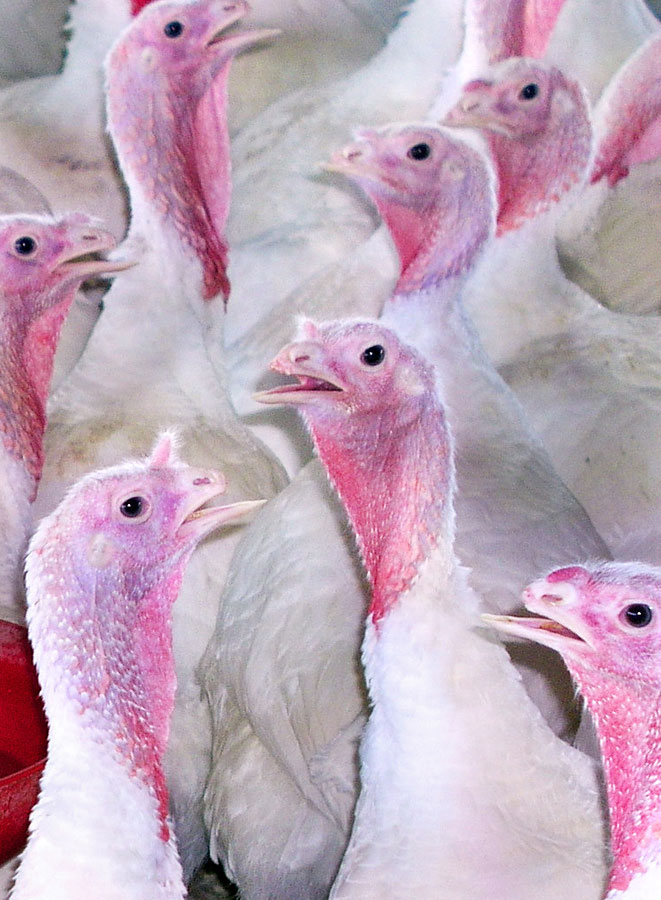Research consortium to sequence turkey genome

An international consortium of researchers has begun an effort to sequence the genome of the domesticated turkey.
The genetic blueprint of the domesticated turkey -- Meleagris gallopavo -- promises to transform avian experimental research and, ultimately, should help improve the quality of this commercially important source of food.
The turkey genome sequence and other genomic resources arising from the sequencing project should provide turkey breeders with the tools needed to improve commercial breeds of turkey for production traits such as meat yield and quality, health and disease resistance, fertility, and reproduction. According to the National Turkey Federation, turkey was the fourth most popular choice of meat protein for United States consumers in 2007 and an estimated 271 million turkeys will be raised in 2008.
Otto Folkerts, associate director of technology development at the Virginia Bioinformatics Institute (VBI), remarked, “We will rapidly establish a draft sequence of the turkey genome using the Roche GS-FLX™ Titanium sequencing technology at the Core Laboratory Facility at the institute. This sequence will be of immediate interest to scientists engaged in turkey research and the starting point for our longer-term objective to sequence more than 95 percent of the turkey genome.”
“Having the turkey genome sequence at hand will help uncover disease-resistance and immune-related genes that can then be targeted to improve our understanding of disease development in the context of host-pathogen interactions,” said Rami Dalloul, assistant professor of animal and poultry sciences at Virginia Tech. “Such discoveries will help direct our efforts to enhance the competence of the turkey immune system and develop new, more effective disease-prevention strategies.”
“The time is right to sequence the turkey genome,” said Jerry Dodgson, professor of microbiology and molecular genetics at Michigan State University. “The sequence of the chicken genome is known and continues to be refined. The scientific community has established many of the experimental resources that make this project feasible. Pyrosequencing on the Roche GS-FLX platform and assembly of the sequence using the publicly available chicken sequence as a reference represents a very cost-effective approach to deliver the turkey genome sequence rapidly to the wider scientific community.”
“The turkey genome sequencing effort is a community-driven project,” said Ed Smith, professor of animal and poultry sciences at Virginia Tech. “Some of the leading researchers behind this initiative met recently at VBI to participate in a Turkey Genome Sequencing Consortium Mini Symposium. We are very fortunate and excited to have some of the leading practitioners in poultry science and comparative genomics committed to this sequencing effort.”
The consortium will be instrumental in the collective annotation of the first assembly of the turkey genome as well as future versions of the sequence. The assembled and annotated genome sequence will be made freely available to the global research community and will be publicly released to GenBank, the National Institutes of Health’s public repository for genetic sequences.
Bruno Sobral, executive and scientific director of the Virginia Bioinformatics Institute, noted: "This project showcases how VBI's capabilities contribute to the development of world-class research initiatives, such as this state-of-the-art sequencing project. We are excited to make our capabilities available to Virginia Tech researchers, the wider scientific community, and other partners as part of this innovative, collaborative sequencing initiative."
The purchase of the Roche GS-FLX™ was supported by funds from the Virginia Commonwealth Research Initiative. Funding for the pilot phase was provided by the following: the Office of the Vice President for Research, the College of Agriculture and Life Sciences, the Fralin Life Science Institute, Virginia Bioinformatics Institute -- all at Virginia Tech; and the external consortium members, the Roslin Institute, Michigan State University, University of Minnesota and Utah State University. The Consortium acknowledges Roche Applied Sciences for in-kind support. The participants in the Turkey Genome Sequencing Consortium include: Dave Burt (Roslin Institute, University of Edinburgh), Roger Coulombe (Utah State University), Rami Dalloul, Audrey McElroy, Ed Smith, and Eric Wong (Department of Animal and Poultry Sciences, College of Agriculture and Life Sciences, Virginia Tech), Jerry Dodgson (Michigan State University), Oswald Crasta, Clive Evans, and Otto Folkerts (Virginia Bioinformatics Institute at Virginia Tech), Rick Jensen (Department of Biological Sciences, College of Science, Virginia Tech), and Kent Reed (University of Minnesota).



.jpg.transform/m-medium/image.jpg)
